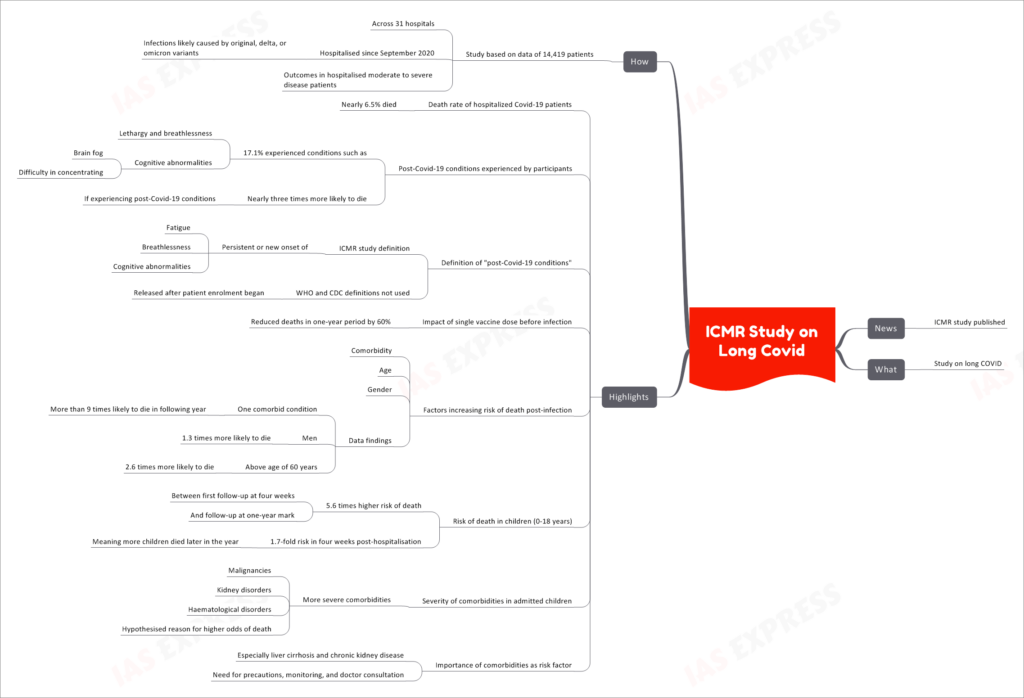ICMR Study on Long COVID

The publication of an ICMR study on long COVID offers a significant breakthrough in understanding the lingering effects of the virus on patients.
News: ICMR Study Sheds Light on Long Covid
The release of the ICMR study takes center stage, shedding light on the impact of COVID-19 beyond its acute phase and offering insights into the long-term consequences experienced by patients.
Investigating Long Covid: A Holistic Approach
Study Focus
The ICMR study zeroes in on the phenomenon of long COVID, exploring the persistent post-COVID conditions that many patients experience after the acute infection has subsided.
Death Rate Among Hospitalized Patients
The study uncovers that nearly 6.5% of hospitalized COVID-19 patients succumbed to the virus.
Post-Covid-19 Conditions: A Glimpse into the Impact
Participants in the study reported experiencing various post-COVID conditions. Notable among these were:
- Lethargy and breathlessness
- Cognitive abnormalities, including “brain fog” and difficulty concentrating
Increased Likelihood of Mortality
Participants experiencing post-COVID-19 conditions were nearly three times more likely to die compared to those without these conditions.
Defining Post-Covid-19 Conditions
The ICMR study uniquely defines “post-Covid-19 conditions” as the persistent or new onset of fatigue, breathlessness, and cognitive abnormalities. This definition differs from those of the World Health Organization (WHO) and the Centers for Disease Control and Prevention (CDC).
Impact of Vaccination and Risk Factors
Single Vaccine Dose and Reduced Deaths
One of the study’s revelations is that a single vaccine dose administered before infection reduced the risk of deaths within a one-year period by 60%.
Risk Factors for Mortality
Several factors emerged as significant risk factors for death post-infection, including:
- Comorbidity
- Age
- Gender
Data Insights: Comorbidity and Risk of Death
- Having even one comorbid condition increased the likelihood of death by more than nine times within the following year.
- Male patients were 1.3 times more likely to die.
- Patients above the age of 60 were 2.6 times more likely to die.
Vulnerability in Children
The study highlighted a 5.6 times higher risk of death in children aged 0-18 years. The risk increased between the first follow-up at four weeks and the follow-up at the one-year mark. Notably, a 1.7-fold risk was observed within four weeks post-hospitalization, indicating that more children died later in the year.
Comorbidity Severity in Children
Children with more severe comorbidities, including malignancies, kidney disorders, and haematological disorders, faced higher odds of death.
The Role of Comorbidities
The study underscores the significance of comorbidities, particularly liver cirrhosis and chronic kidney disease, as critical risk factors for mortality. This emphasizes the importance of precautions, continuous monitoring, and consultation with healthcare professionals.
Methodology and Scope
Study Parameters
The ICMR study is grounded in the data of 14,419 patients across 31 hospitals. The study focused on patients hospitalized since September 2020, during which infections were caused by various variants, including the original, delta, and omicron.
Participants and Outcomes
The study concentrated on patients with moderate to severe disease who were hospitalized, providing insights into the outcomes of this particular group.
If you like this post, please share your feedback in the comments section below so that we will upload more posts like this.

